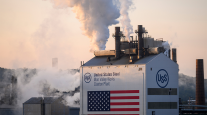Key Departures at the White House Raise the Risk of a Trade War

President Donald Trump’s push for import tariffs and the recent White House personnel upheaval increase the chance of a global trade war — and traders need to stay alert, because the end result could be the reappearance of inflation, according to at least one market analyst.
“We’ve gone a long time with a 0% chance of a trade war, it’s now higher than that — probably significantly higher than that,” Matt Maley, a Miller Tabak equity strategist, said by phone. “The internationalists have lost and the nationalists have won.”
RELATED: Europe to Trump - If you want a trade war, you’ll get one
There’s been no shortage of news out of the White House in the last week. Gary Cohn exited his post as the president’s top economic adviser. Tariffs were implemented on steel and aluminum. Trump ousted Rex Tillerson as secretary of state. The administration decided to seek tariffs on Chinese imports to compensate for intellectual property theft. And Broadcom’s proposed takeover of Qualcomm Inc. was blocked with an executive order.
With of this activity to digest, the markets are facing an overriding question: Has the risk of a trade war grown?
RELATED: Trump’s trade war and the $470 billion hit to the global economy
“The firing of Tillerson put the probability of a trade war a little bit higher,” Luca Paolini, chief strategist for U.K.-based Pictet Asset Management, said by phone. “So if it was 10% before, now it’s probably 15. It’s still quite low, but we can’t rule it out.”

Olivier Douliery/Abaca Press/TNS
Maley agrees the odds have climbed. While there’s no guarantee of a drastic escalation in tensions, trade relations are bound to deteriorate as the U.S. shifts to a more protectionist stance, he said. And if a trade war does ensue, that could help revive inflation that has been stubbornly low since the recession.
“When you raise tariffs, it raises the costs of the products that are coming in,” Maley said. “It might help the domestic producers over the longer-term, but near-term it raises prices. Trade wars are inflationary.”
RELATED: US trade gap widens to post-recession high
To be sure, there are strongly divergent views on the likeliness of this scenario. Famed international investor Mark Mobius, former chairman of Franklin Resources, called the talk of a trade war “overdone” during an interview with Bloomberg TV. Meanwhile, Business Roundtable President and CEO Joshua Bolten called the plan for tariffs a “recipe for disaster and cascading trade war.”
Heightened trade tensions could also be an underlying culprit for the weakness in tech stocks this week, Maley said. The Nasdaq Composite Index fell for the first time in 8 days March 13, outpacing declines in the S&P 500 Index. Semiconductor stocks also stumbled, falling 1.6%.
“Maybe the trade issue has a bigger impact on tech than people realize,” Maley said. “We had this unbelievable openness in trade, and it’s been positive for a lot of companies, technology in general.”




